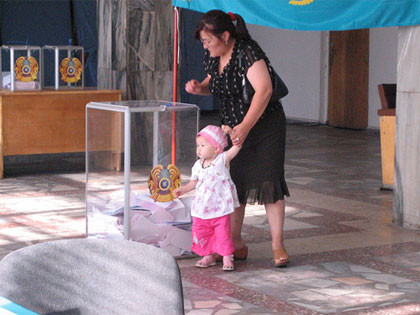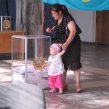
Kazakh Opposition Admits Defeat Ahead of the Presidential Election
Publication: Eurasia Daily Monitor Volume: 8 Issue: 39
By:

On February 21, Kazakhstan’s Central Election Commission announced that 22 candidates had submitted their applications to participate in the upcoming presidential election scheduled for April 3, but only 14 were successful. Seven applicants, according to the Central Election Commission, were removed from the list of candidates either due to poor knowledge of Kazakh or because they withdrew their applications. One candidate did not appear for the language examination.
While the actual motives behind the sudden decision by President, Nursultan Nazarbayev, to shift from the earlier announced referendum for a prolongation of his term in office and instead call snap elections is still unclear, political parties find themselves unprepared in financial as well as organizational terms. Among the 14 candidates allowed to run in the election only three represent political parties: Nursultan Nazarbayev, the leader of Nur Otan Party, Gani Kasymov of the Party of Patriots and Zhambyl Akhmetbekov, the secretary of the People’s Communist Party of Kazakhstan. According to the Constitution of Kazakhstan to run for the presidency a candidate has to be above the age of 40, have a fluent command of Kazakh and reside in the country for more than fifteen years.
Salim Oten, a self-nominated candidate complained to journalists, that Nazarbayev is misusing his presidential powers to promote his re-election campaign. “Illegal campaigning for President Nazarbayev is running every night on state television. They show Nazarbayev shaking hands with people, and talking to them. If Nazarbayev is a candidate his functions as president should be suspended for the pre-election period,” protested Oten (KTK TV, February 18).
It is evident that Nursultan Nazarbayev will use to the full his administrative resources and every other available means to remain in power.
One of the most serious hurdles for many presidential hopefuls has turned out to be the Kazakh language test. Surprisingly, a considerable number of those who submitted their applications to the Central Election Commission for registration came from the politically low-educated category of citizens: unqualified workers, pensioners, school teachers, unemployed people. Myrzatai Zholdasbekov, the chairman of the linguistic commission of the Central Election Commission complained that many candidates take language tests too light-heartedly. “On Saturday we waited for Amantai-khadji (one of the contenders) for 50 minutes to appear for the language examination. He did not even respond to our telephone calls,” complained Zholdasbekov. Moreover, Zholdasbekov announced the linguistic test results of another candidate, Tolybai Baimurzin, who made 52 mistakes in a two-page Kazakh text (Khabar TV, February 19).
Such anecdotal cases make the entire pre-election process surreal. It is obvious that in the present balance of political forces and immense popular support the incumbent president will easily win the election. Even before the planned referendum last year, the powerful pro-presidential Nur Otan People’s Democratic Party rallied loyal forces around Nazarbayev creating the People’s Coalition, which includes the Adilet Democratic Party, Party of Patriots, Rukhaniat Party, Aul Social-Democratic Party, Ak Zhol Democratic Party and Communist People’s Party of Kazakhstan. Although the coalition was conceived as a temporary alliance created to campaign for a referendum in favor of Nursultan Nazarbayev and in the context of the upcoming elections some of the coalition members regained the sense of independence from the Nur Otan Party, most of them are reluctant to challenge Nazarbayev’s presidency. “The current situation is not propitious for the participation of the Rukhaniat Party in the presidential election, since present circumstances make it impossible to talk of equal, fair conditions for all parties participating [in the election process],” according to the leader of Rukhaniat, Serikzhan Mambetalin (Panorama, February 18).
On the eve of the election campaign, only a handful of the parties offered election programs appealing to the wider public. The Communist People’s Party of Kazakhstan announced during its fifth congress the nationalization of energy, mining and oil industry and the restriction of the amount of foreign investments as the key points in its program. The chairman of the National Anti-Corruption Committee, a self-nominated candidate Zhaksybai Bazilbaev, said he would share his presidential power with other political parties and create a coalition government (Panorama, February 18).
However, Bazilbaev, a dark horse in the presidential race, is a puzzle for many observers. In the 1999 and 2005 presidential elections Bazilbaev withdrew his candidacy in favor of President Nazarbayev. Gani Kasymov, the leader of the Party of Patriots, who applied for registration only a few hours before the close of registration on February 20 is also unpredictable. Almost all the opposition leaders admit that they are too weak and disorganized to compete against the incumbent president. Following the Azat United Social Democratic Party (EDM, February 15), Communist Party of Kazakhstan and the unregistered “Alga! Party,” allies within the People’s Power opposition block announced they will abstain from the election.
Most of the candidates, including the leader of the Union of Muslims of Kazakhstan Murat Talibekov and Kurmangazy Rakhmetov, an activist of the Zheltoksan People’s Democratic Association, will find it almost impossible to collect the required 91,000 signatures within such a short time. But for them, as well as for political parties and public associations, the presidential race is the only chance to raise their voice and become involved in political activities.




